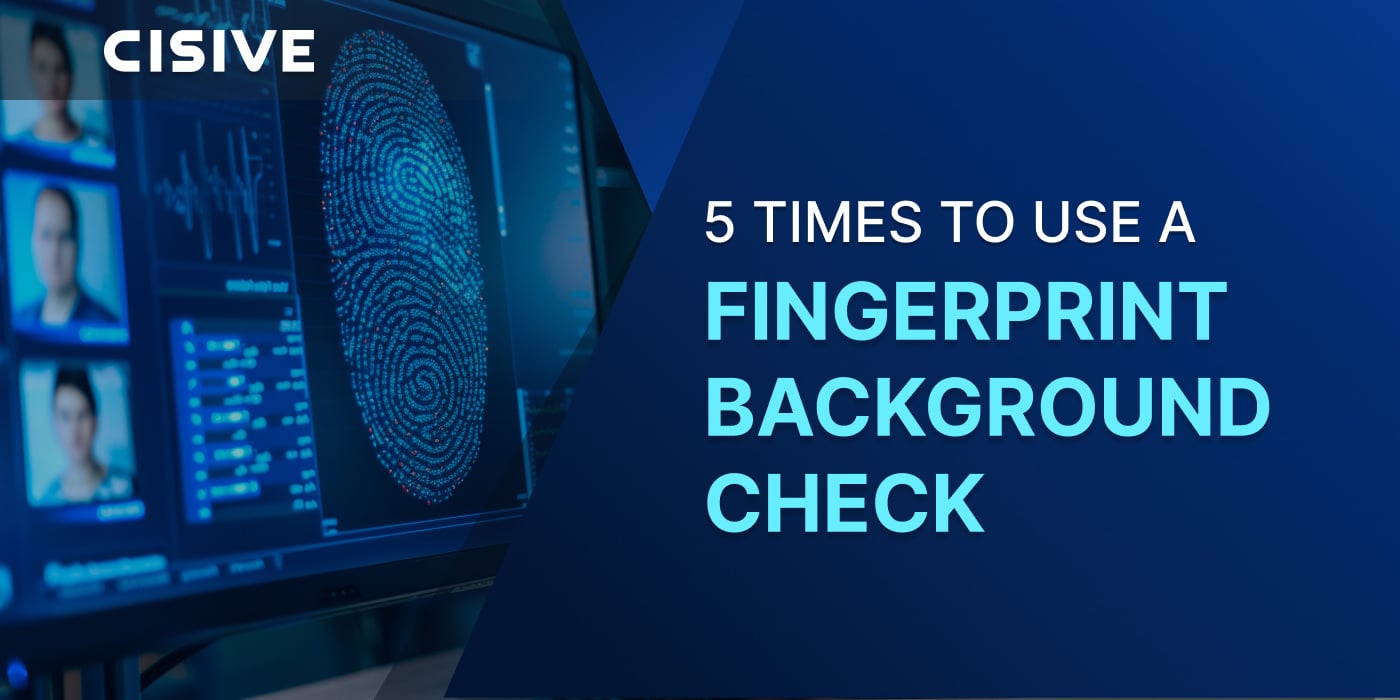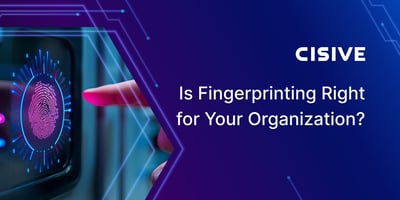

Are you overwhelmed by the maze of complexity in your fingerprint background check process? As an...

Fingerprint background checks have become a key part of the hiring process, particularly in industries where security and trust are paramount. The procedure, while fundamental in protecting safety and compliance, involves navigating a complex web of federal and state regulations.
Learn more about fingerprint background checks and how to invest in the right process for the most accurate results.
Top five takeaways:
|
One of the biggest questions you may have as an HR, security or talent acquisition leader is whether fingerprint-based background checks are even an option for your organization. You likely want the additional screening layer that fingerprinting can provide, but determining eligibility can be tricky.
The first step is understanding your precise need and purpose for conducting fingerprint checks for employment. Are you seeking to verify identity, ensure public safety, or comply with regulatory requirements? You'll also need to research which government agency any collected fingerprints must be transmitted to — usually the Federal Bureau of Investigation (FBI), but sometimes state or other agencies serve as an intermediary to the FBI depending on your location and industry.
Only certain sectors, like financial services, and FBI Channelers, like ScreenID (a Cisive company), have access to FBI history databases. Other fields may involve working within individual state laws or designated vendors first. Before pursuing fingerprinting, take stock of your current screening processes and why you believe an applicant's fingerprints are necessary. Consulting fingerprinting experts can then help assess if your situation can legally and practically support this type of background check program.
Being aware of eligibility requirements up front saves time and resources for your business. With the right guidance, you can make an informed decision on whether fingerprint checks are viable as part of your employment screening program.

Fingerprint background screening for employment serves a wide range of purposes across various industries. Common use cases include verifying the integrity of financial services personnel, securing federal employment positions, and vetting healthcare workers in compliance with state regulations.
These screenings help organizations maintain high standards of trust, safety, and regulatory compliance.
Fingerprinting plays an important role in employment background checks for the banking and financial services industry. Institutions regulated by the Federal Deposit Insurance Corporation (FDIC) regularly rely on fingerprints and criminal history records as a key part of their new employee screening and risk assessment procedures.
ScreenID is an approved FBI Channeler and can efficiently process fingerprints and receive Criminal History Report Information (CHRI) straight from the FBI Systems. This helps streamline the onboarding process for FDIC regulated employers.
ScreenID’s partnership with the FBI makes fingerprinting a simple and straightforward option, since they can access this information directly from the FBI database without additional involvement for industries allowed to process fingerprints directly.
Federal employment is one of the most straightforward use cases, since fingerprints can generally be submitted directly to the FBI, without needing to interface with individual state agencies first. This allows criminal history records to be checked efficiently through the FBI's national database during the screening of direct federal job applicants and employees.
Fingerprinting is also involved for federal contractors as part of obtaining security clearances at the federal level. Fingerprints taken during this process are submitted through Secure Web Fingerprint Transmission (SWFT) and reviewed as part of determining whether a federal contractor is approved to receive a security clearance.
The Financial Industry Regulatory Authority (FINRA) protects investors and the integrity of the stock market — and to that end often requires fingerprinting as part of its SEC certification processes. If you hire individuals who require securities industry licenses, collecting applicant fingerprints is likely necessary.
When pursuing FINRA fingerprinting, the electronic prints will be submitted through FINRA to the FBI. This allows any potential criminal history or record information to be identified upfront. However, results for FINRA submissions will remain in FINRA systems rather than automatically released to your organization.
Typically, the hiring company would need to separately access the federal records system, administered by FINRA, to retrieve fingerprint check outcomes. Proper licensing is dependent on background check clearance, so planning for this FINRA fingerprinting and records retrieval process is important.
If you hire staff who work in healthcare settings, fingerprint-based background checks may be part of your screening requirement. However, navigating fingerprinting requirements can be more complex due to varying state and local laws.
Most states have regulations, under Public Law 92544, governing how healthcare industry applicant fingerprints are submitted and processed. These laws typically mandate a two-step approach — fingerprints must first be sent to the individual state agency before being forwarded to the FBI for a national criminal history search. Working with approved state vendors is usually necessary to ensure legal compliance.
Whether involving state agencies or direct FBI checks, following proper healthcare industry fingerprinting protocols is a must for your screening program. Consulting specialists can help determine your state's specific rules and ensure background checks for healthcare professionals adhere to all applicable regulations.
![]()

Conducting fingerprint background checks for employment can appear to be complex, but working with the right partner makes it easy. Innovative solutions such as remote fingerprint collection and onsite services can significantly streamline the collection process.
Cisive's electronic fingerprinting partner leverages state-of-the-art technology to streamline and secure the fingerprinting process. This comprehensive network ensures fast, accurate, and reliable fingerprint capture, essential for various regulatory and security compliance requirements. By integrating with national databases, it provides seamless background checks, enhancing efficiency and reducing the risk of errors. This network is designed to support diverse industries, ensuring that organizations can maintain high standards of security and compliance with minimal hassle.
With the remote fingerprint package offered by Cisive, your employees are provided local facilities to get their fingerprints taken. This package includes all necessary materials, instructions for submission, and pre-addressed envelopes, making it simple for those who can’t access electronic networks easily.
Onsite services further enhance convenience by catering to specific needs, such as fingerprinting large groups at corporate events or providing personalized services for busy executives. Whether you need to fingerprint a group of interns at a training session or arrange for executive fingerprinting at their homes, these tailored solutions ensure that the fingerprinting process is seamless and efficient.
By leveraging these services, you can make sure that your organization maintains high standards of security and compliance while making the process as convenient as possible for your employees.


As HR, security professionals, and talent acquisition leaders, staying ahead of the curve with innovations in fingerprint background checks is essential for maintaining security and compliance. Recent advancements are transforming how you can manage these processes more efficiently and effectively.
One significant advancement in civilian fingerprinting is the FBI’s Noncriminal Rap Back service. This program allows qualified agencies to enroll candidates in a continuous monitoring system, which notifies you of any changes in an employee's criminal history record information in real-time based on FBI requirements. By leveraging this system, you can make sure that you are informed about potential risks identified to the FBI, enhancing your ongoing security measures and providing peace of mind that your workforce remains compliant with industry standards.
Another groundbreaking innovation is the use of integrated platforms that consolidate various investigative needs into a single, user-friendly system. These platforms — like the one provided by Cisive — enable you to handle the entire fingerprinting and background check process from start to finish within one environment.
From onboarding to offboarding, you can streamline workflows, reduce administrative burdens, and ensure that all necessary checks are completed efficiently. This integration is particularly beneficial for managing high volumes of background checks and maintaining consistency across different departments and locations.

Fingerprint based background checks for employment are a critical component of modern employment screening processes, ensuring the security and integrity of your workforce. By understanding the complexities involved, from navigating state-specific regulations to leveraging direct FBI connections, you can implement robust and compliant screening protocols.
By prioritizing comprehensive fingerprint based background checks, you are taking proactive steps to protect your organization and its stakeholders, fostering a culture of security and reliability.
Want to know if you qualify for fingerprint background checks for employment? Schedule a call with one of our background screening experts.

Are you overwhelmed by the maze of complexity in your fingerprint background check process? As an...

According to a MetroNews article earlier this month, the State Department of Health and Human...

In this Cisive Product Highlight series, we’ll review key tools to consider when screening your...